Send in the Clowns
A review of Irish comedians and the comedy machine:
So, anyway, I was walking down Grafion Street, minding me own business, and I see this guy walking along in front of me and there's a match sticking out of his ear. A match. Sticking out of his ear. So, I tapped him on the shoulder and I said to him, I said, if you don't mind me asking, like, could you tell me what you're doing? I'm listening to the match, says he. Listening to the match! We have a right one here, I says to meself. So, anyway, I decided to humour him and, says I, is it a cup match? No, says he, with a big smile on his face, it's a Friendly! Actually, he was a Kerry man. He told me he was after being listening to the news on the radio and when he heard that the price of gold was going up he went out and bought a hundred goldfish.! Be God, missus, that's a powerful laugh you have. Your hair is lovely, did you set it tonight? Yeah? What time does it go off! Anyway, there was this girl thuming a lift . . .
Some old, some new, most borrowed, some blue. On any given evening the comedy machine is purring away, ejecting its product through a variety of outlets. The product ranges from satires on the pomposity of establishment figures, through rehashes of old panto gags, to the latest adaptation of the Kerry joke (a category which someone will sooner or later dub the "kerrycature"). The outlets are as disparate as the technological grandeur of the TV studio and the isolation of a third-rate sound system in a fifth-rate pub.
There is a human need to strike words together and produce a spark of laughter, a spark that illuminates or relieves. Few of us can resist making public the sparks we strike and a good joke will be retold time and again. And we build a machine to magnify the sparks, to share the jokes with the largest possible audience. In a corner of the RTE canteen a discarded poster sags against the wall: We want an audience to provide lots of loud laughter for and RTE Christmas show, Studio One next Sunday.
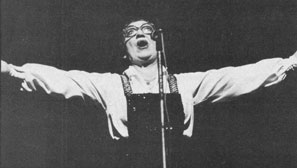 Maureen Potter, diminutive in her brightly lit, pastel coloured dressing room, pauses a second. "Television? Sure, you could ruin yourself on television. I used to do the Christmas shows. They don't seem to ask me any more. And I don't offer." Alternately opening fan letters and brushing her hair with the same manic energy she displays on stage, she continues, " It's very different kind of comedy. Maybe, its like state actors when they do cinema acting…project too much"
Maureen Potter, diminutive in her brightly lit, pastel coloured dressing room, pauses a second. "Television? Sure, you could ruin yourself on television. I used to do the Christmas shows. They don't seem to ask me any more. And I don't offer." Alternately opening fan letters and brushing her hair with the same manic energy she displays on stage, she continues, " It's very different kind of comedy. Maybe, its like state actors when they do cinema acting…project too much"
Most of the barriers between the different comic mediums are crossed frequently by many comedians. From cabaret to revue to panto to radio to record…but infrequently to televsion, at least not very successfully. It is a unique medium. The comedian may be playing to an audience of tens of thousands but gets no reaction, no responsive laughter. Even when that difficulty is overcome the humour must be of a certain type. The huge auience is fragmented into twos and threes in the isolation of their living rooms. The individual memebers of the audience know that the joke is being shared but cannot experience the sharing, and what may seem funny to a collective audience can fail to amuse a fragmented one.
RTE has yet to find the script-writers, producers of comedians capable to successfully handling the medium or to find the resources to put at their disposal. Currently, their most successful expeditions into the field of comedy are guided by self-proclaimed non-comedians. In its twenty year existance RTE has produced only one programme which has consistently and successfully used a comic approach. The fact that Hall's Pictorial Weekly emerged as a humourous programme was not due to planning but to a series of what Frank Hall describes as "lucky accidents". The team behind the show resist the tag "comedians". Frank Hall is a journalist writing a humorous comentary on current political and social nomena and using actors instead of type to transmit his work. Frank Kelly describes himself as "primarily a writer and actor - with an ability to comedy." Eamonn Morrissey has joined the Abbey to do straight acting. He was replaced by Derry Power, another actor with comic leanings.
The programme evolved from the 'five-nights-a-week" Newsbeat. Faced with the task of finding enough currnet affairs material to fill five shows Hall found it expedient to turn the Monday night show into a light-hearted shuffle through the provincial press, emphasising the amusing or peculiar. "County Councillors", says Hall, "are the greatest natural comics in the world. Some of the things they say and get up to you just couldn't invent."
Readers' letters to the programme, often amusing and peculiar in themselves, provided material for the Friday show. Restricted to the scan t resources of RTE's tiny Studio 3, with only two cameras at their disposal, the team produced an amusing but limited programme. Frank Kelly and Eamonn Morrissey were called in to put appropriate accents and comic voices in to the reading of the newspaper clippings. The comic range which they were later to exploit was not the reason for their recruitment - they were simply available, were able to do the appropriate voices, and were known to Hall.
Frank Hall had drifted into journalism, freelancing at first and then getting a job with the Irish Independent. His stint with a semi-pro band earned him the job of writing the Tempo column in the Evening Herald and after eight years in newspapers he moved to the RTE newsroom and there to Newsbeat. Although there had always been a humourous slant to his writing, his Newsbeat scripts called for little performance, with only occasional head shots of the readers. It hadn't occurred to him to try anything more elaborate and, besides, the facilities were restrictive.
At the time of the Cameron Report, Hall, for his own amusement, wrote a sketch based on the old Dr. Finlay's Casebook characters and featuring Dr. Paisley. Not too impressed with his own work, he left the script onhis desk. Several weeks later, after chancing upon the script, finding it funny, and assuming that it was scheduled for production, Caroline Swift overcame Hall's doubts about its quality. It appeared on Newsbeat, with Hall playing Paisley, and was the first of many original sketches based on current affairs.
After seven years of Newsbeat the humourous format was continued in Hall's Pictorial Weekly, the writing increasing in sharpness and the comic talents of Kelly and Morrissey being stretched. The programme continued to evolve rather than develop according to any plan. Someone remembered that there were a couple of insurance executives in Cork, Frank Duggan and Michael Toomey, who could do a comic turn and Hall invented Cha and Miah, two Corkonians with skulls as thick as their accents. The two characters, one a would-be intellectual, drew perverse conclusions from current events, the act worked and it was retained. Hall recalled a couple of old brothers from back home in Newry who specialised in meaningless remarks. That memory resulted in the creation of a couple of characters whose inane "Boys oh boys" comments on the issues of the day brought an immediate and positive response from viewers.
The Pictorial Weekly's finest hour (so far) was during the Coalition regime, when the satirical depiction of government ministers caught the reality of the political atmosphere with greater accuracy than any political pundit. The "Real Taoiseach" label on the Jack Finch character was cruel but funny and accurate in the face of Cosgrave's blustering. The clicking of heels, wearing of swastikas, fascist salutes and addressing of the the Cosgrave character as "Fuehrer" was appropriate to the mounting and justified paranoia in the face of repressive legislation, the Heavy Gang and threats of hanging. Senator John A. Murphy claimed that Pictorial Weekly helped bring down the Coalition. Hall says he would be kidding himself if he took such a suggestion seriously. "One would like to think that one is capable of doing something useful, even if it's only bringing down the government, but I'd only be flattering myself."
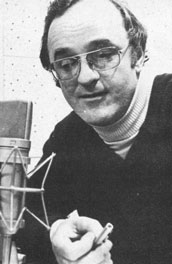 Since the fall of the Coalition viewers have waited in vain for a similarly vicious treatment of Fianna Fail. Apart from Frank Kelly's depiction of the petulant, pin-hole mouthed Dessie O'Malley there has been little to match the accuracy and insight of the Coalition period. Hall explains this by pointing to the lack of colour in the Fianna Fail camp. "Remember the night Garret FitzGerald got up from his fire and drove in to the Late Late studio because he disagreed with something on the programme? You don't get the Fianna Faillers sticking their necks in where they can keep them out. Someone like Michael 0 'Leary, he had what I'd suppose you'd call a high profile and his lifestyle was common knowledge. But, take recently, we did a sketch with Martin O'Donoghue - and no matter how good the make-up is, his character is so unobtrusive - I don't think anyone knew who the hell he was supposed to be."
Since the fall of the Coalition viewers have waited in vain for a similarly vicious treatment of Fianna Fail. Apart from Frank Kelly's depiction of the petulant, pin-hole mouthed Dessie O'Malley there has been little to match the accuracy and insight of the Coalition period. Hall explains this by pointing to the lack of colour in the Fianna Fail camp. "Remember the night Garret FitzGerald got up from his fire and drove in to the Late Late studio because he disagreed with something on the programme? You don't get the Fianna Faillers sticking their necks in where they can keep them out. Someone like Michael 0 'Leary, he had what I'd suppose you'd call a high profile and his lifestyle was common knowledge. But, take recently, we did a sketch with Martin O'Donoghue - and no matter how good the make-up is, his character is so unobtrusive - I don't think anyone knew who the hell he was supposed to be."
Mike Murphy was dying a death. "I would like to deny the scurrilous rumours flourishing in the wake of last week's programme that myself and Maurice 0 'Doherty are getting together to make a song and dance routine". Not a titter. "At least not unless he agrees to do the dancing and I do the singing." Nothing. In the nearest Murphy ever gets to desperation he ad-libbed a sentence in a not-half-bad imitation of 0 'Doherty's subterranean tones. Lord be praised, they giggled. Into joke Number Two and it's lead balloon time again. In rehearsal Murphy had paused after mentioning "that genial municipal public servant Paddy Belton". Now, live on the air in front of a dead studio audience, he didn't bother pausing for laughter. A weak crack about Liam Nolan and Gay Byrne drew some guffaws, more for its celebrity value than its humour. With the right gags and the right atmosphere Murphy can get laughs, but he's no comedian.
"In fact, I get a bit annoyed when people refer to me as such", he says. "I'm not and don't purport to be a comedian". Murphy's talent is an intangible one, an ability to confront a microphone or camera without flinching and to use the electronic instruments to transmit an undistorted image of his personality. Fifth-rate gags and solemn introductions to discussions of social issues are transmitted with equal facility.
The final third of The Live Mike is where the comedians gather. Although Murphy helps out in routines it is Twink and Dermot Morgan who are the pros. Murphy and producer John Keogh were deliberately aiming at a particular kind of TV humour when they recruited the comic talent. "The thing about both Twink and Dermot", says Murphy, "is that they don't think in terms of gags. They're highly innovative and can do more than justice to even a weak script, and their humour has something of a hard edge to it."
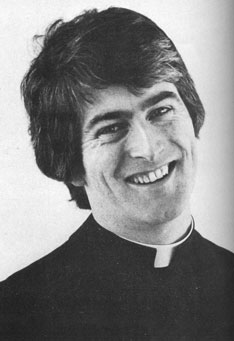 Morgan is still remembered by ageing UCD graduates for his satirical contributions to college revues in the early 1970s. By 1977 he began working the cabaret circuit, without setting it alight, while retaining his job as a teacher. The Live Mike exposure may give him the boost needed to go professional. Consciously following the style of character comedians such as Billy Connolly, Morgan creates characters based on social types such as the aspiring executive, the media-conscious priest or the showband singer, Big Gom. His Fr. Trendy has been the most successful creation, capturing accurately the ingratiating whine of the young priest who has done a communications course and wants to talk "in a language they understand".
Morgan is still remembered by ageing UCD graduates for his satirical contributions to college revues in the early 1970s. By 1977 he began working the cabaret circuit, without setting it alight, while retaining his job as a teacher. The Live Mike exposure may give him the boost needed to go professional. Consciously following the style of character comedians such as Billy Connolly, Morgan creates characters based on social types such as the aspiring executive, the media-conscious priest or the showband singer, Big Gom. His Fr. Trendy has been the most successful creation, capturing accurately the ingratiating whine of the young priest who has done a communications course and wants to talk "in a language they understand".
I would like to say that, for me, life is like a package deal ... Heaven is like the good holiday and life is the plane that takes us there - except that, on the plane of life, there is no duty-free. We can't be free of duty ... so, when you pick up your baggage to get on life's plane, what destination will you put on the baggage label ... Costa del Heaven or Costa del Hell?
With only minor alterations, the best of Fr. Trendy's homilies could be run on the late-night TV God-slot.
Adele Condron-King, more familiar as Twink, has been through most branches of show business. As a child she trained as a dancer and musician, joined the Young Dublin Singers at 6, became one of the Gaiety kids, transferred to Jury's cabaret at 12, played the harp for tourists in most of the harpy castles around the country and sang vocal backing on records.
 From this last occupation the singing trio Maxie, Dick and Twink emerged and successfully did the rounds of Opportunity Knocks, The National Song Contest and the clubs and ballrooms before breaking up in Canada in 1970. She did a seven year stint singing with showbands, four of those years in Las Vegas and still does vocal backings, advertising jingles and the odd spot of cabaret. Her move into comedy and mimicry, first on radio in Taking Off, and then with Murphy, was encouraged by producer John Keogh, "who of-course-you-coulded me into it." Part of the reason for her success is the surprise at the ability of a one-time showband singer to adjust so easily to comedy. More than one fellow comedian refers to her as "the Maureen Potter of the 1980s".
From this last occupation the singing trio Maxie, Dick and Twink emerged and successfully did the rounds of Opportunity Knocks, The National Song Contest and the clubs and ballrooms before breaking up in Canada in 1970. She did a seven year stint singing with showbands, four of those years in Las Vegas and still does vocal backings, advertising jingles and the odd spot of cabaret. Her move into comedy and mimicry, first on radio in Taking Off, and then with Murphy, was encouraged by producer John Keogh, "who of-course-you-coulded me into it." Part of the reason for her success is the surprise at the ability of a one-time showband singer to adjust so easily to comedy. More than one fellow comedian refers to her as "the Maureen Potter of the 1980s".
Danny Cummins grinned. "I'll do any form of entertainment - as long as it's work." Donning his Ugly Sister costume for the Olympia's Cinderella, the last of the great Dame Comedians added, "I'm told I'd go down a bomb in the Braemor Rooms in cabaret - but, sure, I don't even know where the Braemor Rooms is." Cummins first appeared in the Gaiety in 1925 and can quote dates like a computer ("June 3rd, 1928 in the Hippodrome, Manchester") when recalling his career. "I do cabaret now and then - not as much as I'd like - but they almost want blood. Instead of hearing the feed line, I remember, in Clontarf Castle, you'd hear someone calling for two pints, three vodkas and a gin and tonic. You can't be subtle or soft - you'd be wasting your time."
Cummins will be playing an 0 'Casey part for RTE in March. If you don't make it into television - and few do - a comedian must work the circuit, from the expensive theatre production to the stand up gigs in the pubs, "as long as it's work". Some of the biggest names can demand £600 for a cabaret appearance - they won't get it too often but they don't want to do it too often. Others get £150 and do it as often as possible - sometimes twice or three times an evening.
Sil Fox is one of the busiest comedians on the circuit, with most of his evenings booked up months ahead. After working as a semi-pro for several years he abandoned his fulltime job in 1974 and went on the circuit. He'll work anywhere and do anything to get a response out of an audience. He's currently working a new song into the act, a lachrymose country and western dirge called The Drunken Driver. "you should hear my monologue on the Pope in the Phoenix Park, I call it "My Day To Remember". It gets a standing ovation. Mention God at twenty to eleven and you'll bring the house down."
Supremely skillful at judging the mood of an audience, Fox plays for a response. A laugh, applause, a cheer, a tear. He plays the hardest audiences, the pubs and the stags, and knows how to win them. "I mean, what do you do? It's tenfifteen and they're half-pissed, and if you try to do anything complicated they won't even listen to you. So, you give them a bit of the blue."
Old Chinese proverbs: Confucious, he say, man who have hand in pocket feel cocky. Man with two hands in pockets not necessarily feel two cocky. Confucious, he say, lingering kiss like spider's web - can lead to flies undoing. Confucious, he say, secretary not properly piece of furniture until screwed on floor. Confucious, he say, man who make love to woman on grass have piece on earth. Confucious, he say, girl who sit on jockey's lap get red hot tip.
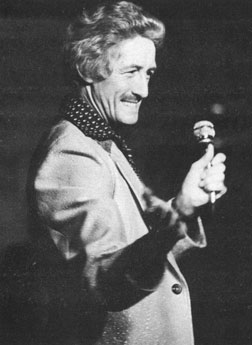 The blue is the easiest way to grab an audience's attention. If humour is a shield there is no part of the human psyche in our society more in need of shielding than sexual insecurity. The audience will listen to the comedian in the hope of hearing and remembering the kind of joke appropriate to their own insecurities so that it can be used
The blue is the easiest way to grab an audience's attention. If humour is a shield there is no part of the human psyche in our society more in need of shielding than sexual insecurity. The audience will listen to the comedian in the hope of hearing and remembering the kind of joke appropriate to their own insecurities so that it can be used
tomorrow. The weakness of the joke doesn't matter too much. The closer to the insecurity the bigger the laugh.
They went into a pub, it was called the Frustrated Virgin. It used to be called the Halfway Inn. And she said she'd buy the first drink so he says "M ine 's a large one ". Says she. "are you drinking or are you boasting? " ...
Not all of Fox's jokes are as weak. Mick went to work in this mine and on his first day he asked the foreman "Where's the drill?" The foreman says, "Sorry, but this is a very poor mine, we don't have a drill and you 'll have to dig the coal out with a hammer and chisel". So Mick starts working and then he asks the foreman, "By the way, where's the cart to take the coal away?" "Sorry", says the foreman, "this is a very poor mine, we don't have a cart, you'll have to take it away with that shovel". So Mick is working away and he notices this bat flapping around the mine. And it was annoying him. So he threw the hammer at it and Whack! he killed it. So, the shop steward says, "OK, lads, that's it, everyone out. The fan is gone. "
However, when he is working the stag audience at the Wexford Inn on Sunday mornings, Fox dare not leave anything to chance. The jokes, sexual or not, are peppered with the various common terms for copulation, defecation and genitals of all shapes and sizes. The comedian must become one of the lads, emphasising the key words that proclaim the collective "masculinity" of the stag.
Dermot Morgan recalls working a stag on a Sunday morning for a fiver. He did his usual act and died. A friendly comic who knew the pub took him aside with a bit of advice about the blue. Morgan returned to the stag with the bluest gags he could uncover. And died again. The stag performance might appear to be a case of the worst coming to the worst. But there is a talent among such comedians for blending in with their audience. When he jumps on stage at the Noggin Inn to conduct his "Nutts Nite Out", a mixture of stand-up comedy and audience participation in the style of TV's Generation Game, Sil Fox as surely slips into the persona of Bruce Forsyth.
"Television", says Fox. "Of course I'd like to be a big TV star. It would get me known around the country, for
one thing. Outside of Dublin they haven't heard of me. It would be nice, but TV can't make you. This is where the money is. TV can kill you, but it can't make you. If you're a big hit you'll get lots of bookings. Then, sure, I have them anyway. And if you bomb - well, you're on a hiding to nothing."
Brendan Grace has opted out of the circuit. "If you want to get people to come here to see you in large numbers you can't be appearing all over the place every night of the week. It spoils the magic." Still recovering from a motorcycle accident which occurred eight months ago, Grace intends crossing the barrier into panto and revue comedy and staying there. With ten years on the circuit and a TV series behind him he stands a reasonable chance of making it. Since Christmas he has been clambering around the Olympia stage on crutches in Cinderella. He will be back there, in his own production, in the summer. Another Maureen Potter of the 1980s.
When Grace's character, "Bottler" the schoolboy guerilla, became successful Grace received a letter from Paddy Crosbie claiming that the character was a copy of Crosbie's old "Mucky Dunne". "I used to hear him on the radio, okay," says Grace, "but I never saw the act on stage, all dressed up, so I couldn't have copied it." The character is, as are most of Grace's gags, an exaggeration of Dublinisms.
You want me to sing the twelve 'imes table. Eh ... do-do de-do do-do, oh, twelve times one is twelve, twelve times two is ... do-do de-do do-do, oh, twelve times one is twelve, twelve times two is ... eh, well, I know the tune but I can't remember the words.
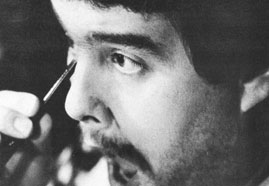 Grace gave up his job in a bar in 1970 and took his guitar to the ballad scene, "telling jokes every time a string broke". Evidently he broke a lot of strings, as his act changed from songs with the odd gag to gags with the odd song thrown in. "But, still, I'd never go out there without the guitar. If the worst happens and they're not laughing I can just go into a song so I'm not left standing there."
Grace gave up his job in a bar in 1970 and took his guitar to the ballad scene, "telling jokes every time a string broke". Evidently he broke a lot of strings, as his act changed from songs with the odd gag to gags with the odd song thrown in. "But, still, I'd never go out there without the guitar. If the worst happens and they're not laughing I can just go into a song so I'm not left standing there."
However successful both Twink and Brendan Grace are in the coming years it is likely that the real Maureen Potter of the 1980s will be the same Maureen Potter of the 1970s and 1960s and 1950s…They're still turning in to hear her turn it out. She still refuses to walk across the stage when she can run. Or to move a yard without doing a funny jump or making a funny face. She delivers her Political Cowboy Story, In Goldilocks at the Gaiety, with the same malicious innocence.
Bonanza Haughey has a real big spread - despite his jogging. He's got a real soft spot for Cheyenne Colley the Bog of Allen ... suddenly 82 shots rang out and Cheyenne Colley hit the ground. He's been on the floor more times than a Curragh carpet . . . and Big Jack found himself out in the cold, and he couldn't even put on his coat because there were so many knives in his back ...
Sil Fox left the stage in the Wexford Inn and left the crowd roaring for more. "A big hand, folks, a big, big hand for Sil Fox, eleven weeks here and he never repeated Himself!" In his box-like dressing room Fox was inviting a couple of band members down for a drink. Gags pouring out of him compulsively. Someone mentioned football.
Shelbourne? Shelbourne! They're so for down the table they're nearly fallling off the bottom of the newspaper! The last time they won the cup Robin Hood robbed it off them on the way home! The next time they win the cup they'll step up and the Queen will present it to them ... go on, tell me we don't have a queen - well we
will have by the time Shelbourne win the cup!
Equipped with a mind that can recall a gag at a mention of a key word, Fox prepares for a show by scribbling out a list of words meaningless to anyone else but which will start him spouting. A couple of words and a squiggle translate into part of a routine.
(80 Allegro
81 Rover )
.. so I said to her, this is a new kind of car, it's half an A llegro and half a Rover. It's called a Legover. I've done eighty in this car, I said. Eighty?, says she. Yes, says I, and you'll be the eighty-first.
Without a mind like a filing cabinet a comedian must find another approach. "I still basically consider myself an actor", says Des Keogh. "I approach any performance as an actor. I'm terrible at telling jokes and I'm lost without a script, can't ad lib at all." Even when doing a cabaret gig Keogh learns the lines like an actor, decides which way to play the jokes and goes out on stage and gives a performance of a stand-up comedian's routine. He would be lost in the Noggin Inn. He and Roseleen Linehan have worked as a team, along with scriptwriter Fergus Linehan, since university days. They are giving the double act a rest this year, having done a hundred revue performances last year.
Keogh has been performing along with Maureen Potter at the Gaiety. "I found it difficult at first. I prefer things to be more disciplined, precisely rehearsed. But I enjoy it now, even when Maureen or one of the others throws in an ad-lib, I'm getting that I can handle it."
Frank Kelly switches from Pictorial Weekly to Wanderly Wagon to advertising jingles to radio comedy with equal facility. Apart from his television roles he writes his own material, and is currently working on a novel.
"I don't choose to do this format or that format, I take each job as it comes. There isn't a big market for anyone particular kind of humour, so the more versatile you are the more work is available."
Most of the material which Kelly writes himself is lightly satirical. He uses the village of Ballykilferret (a first cousin of Hall's Ballymagash) as a microcosm of Irish society. He often uses the imaginery telephone call technique perfected by the American comedian Shelly Berman. The Ballykilferret School of Motoring:
Most of the methods and techniques of driving around here is local, like. You have to teach them that, like, 'cos things is different down here, y'know. Like, most of the lads here drives the '66 Austin Cambridge ... most of the shock absorbers are gone in them from driving over the fields and the lads does be towing with them as well, like, and it's very hard to see out over the front when the nose of her is up in the air, like ... some of the lads, like when they'd be coming back late at night and they'd be towing, like, and they'd have a few drinks in them, well, they'd be navigating by the stars. And himself teaches all that ...
When he is not performing Kelly doesn't play the funnyman. "If someone is constantly trying to be funny, telling jokes all the time, there's Something wrong with them. You can become self-absorbed, start trying to buy people's friendship with your humour. It's not an easy business,. and people can be cruel when you've set yourself up as a comedian. They can adopt the attitude that you've asked for it and we're going to get you. And then when you fail they'll remark that it's a terrible thing, someone with all that talent. "
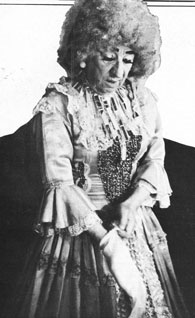 The handful of women comedians who have been successful, Maureen Potter, Roseleen Linehan, Twink, is probably due to the fact that this is just one more field where women have to be extra good before breaking into a field dominated by men. "It probably has something to do with the traditional attitude to women", says Twink. "The attitude that you, shouldn't laugh at a lady - it's okay, laugh at a man who falls on a banana skin, but ladies ... And then a man just has to dress up in women's clothes to get a laugh - but it doesn't work the other way around".
The handful of women comedians who have been successful, Maureen Potter, Roseleen Linehan, Twink, is probably due to the fact that this is just one more field where women have to be extra good before breaking into a field dominated by men. "It probably has something to do with the traditional attitude to women", says Twink. "The attitude that you, shouldn't laugh at a lady - it's okay, laugh at a man who falls on a banana skin, but ladies ... And then a man just has to dress up in women's clothes to get a laugh - but it doesn't work the other way around".
At the time of the Corporation dispute, when soldiers were brought out to shift rubbish, the Live Mike team had an idea for a take-off of the current army recruiting film with the souped-up Beethoven soundtrack. Instead of the briskly edited shots of make believe derring-do they would have briskly edited shots of the squaddies heaving bins and sacks full of stinking garbage, with the tag line "Join The Defence Forces and Places". The idea was still-born as it would require several day's expensive filming to bring alive.
Frank Hall had to insist that two editions of the Pictorial Weekly be dropped when Jack Lynch resigned, as they were outdated. His scripts must be written a fortnight before the show and a list of necessary props handed in a week early. Rarely does the programme step outside the stock sets, "It's standardised as a matter of policy", says Hall, "and the sets must be the cheapest in the business", The Live Mike programme is severely restricted in its choice of sets and props, so that scriptwriters must work withim narrow limits.
The tightness of Pictorial Weekly, with Hall writing for people he knows, within fairly simple limits, is part of its success. But it has taken many years to evolve such a programme and the lack of resources and massive outlay necessary to mount any programme means that only the tip of the comedy machine will emerge on RTE. Out on the circuit it's hard work, sometimes cruel. The rewards can he high, however, as much of the payments for cabaret work are passed under the table out of sight of the tax people.
Last year Danny Cummins received an invitation from an Irish emigre group, the Wild Geese Society, to do cabaret in Lusaka. He would be flown out, do a twenty minute spot, have a suite of rooms, have the run of all the hotel facilities for three weeks. And no fee. He considered the offer and his wife urged him to accept, even if only for the publicity value. "My darling dear", he told her, "we can't eat what it says in the papers". He eventually refused, wary of the African climate, "But it was nice to know that someone remembers, that the public haven't forgotten you. It's nice that someone knows you're good at what you do. That makes it worthwhile."
